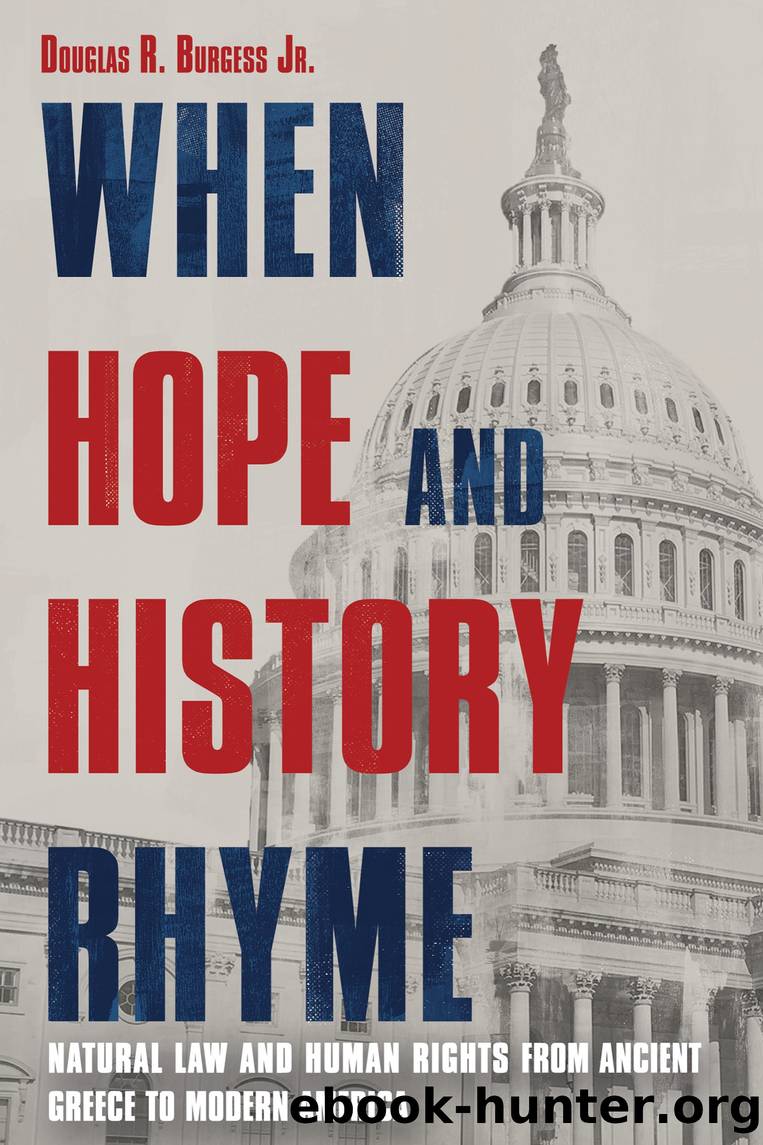When Hope and History Rhyme by Douglas Burgess

Author:Douglas Burgess [Burgess, Douglas]
Language: eng
Format: epub
Publisher: Charlesbridge
Published: 2022-03-08T00:00:00+00:00
Conceptualizing the Nuremberg Tribunal as humanityâs attempt to restore faith in itself brings it squarely within long-standing debates about natural law. Recall the ancient dichotomy between Demosthenes and Xenophon. Demosthenes writes of the law as a moral truth, âa discovery and gift of the gods, and at the same time a decision of wise men, and a righting of transgressions.â Countless scholars from Cicero to Aquinas to Coke reiterated and reinforced this image. Yet Demosthenesâ contemporary Xenophon, a student of Socrates, saw the law very differently: âWhatsoever the ruling part of the State, after deliberating as to what ought to be done, shall enact, is law.â Law is essentially amoral, the articulated and enforced will of the state. This view too has a long and distinguished history, from Plato to the positivists. âEverywhere justice is the same thing,â says Thrasymachus in Platoâs Republic, âthe advantage of the stronger.â [12]
An enthusiastic proponent of legal positivism was Adolf Hitler. Between 1933 and 1945, centuries of German law were arbitrarily swept aside by Gemeinschaftsdenken, âcommunal thinking.â Laws passed unanimously through the Reichstag, which now existed purely as a rubber stamp, or were issued as MaÃnahmen, âarbitrary measures,â and Führerprinzip, âFührerâs orders.â The Nazis called upon judges to âovercome narrow normatismâ through a process euphemistically described as unrestrained interpretation. The result, as one historian writes, was âthat the judiciary, because of its positivist orientation, [was] helpless in the face of a legislator freed from all constraints.â[13] It is tempting to see Nazi law as raw articulated power absent any ideological or ethical buttressing, consistent with a Nazi âphilosophyâ that was both inchoate and contradictory. Yet if Nazi law had existed for the sole purpose of extending and reinforcing the stateâs tyrannical grip and implementing its policies, it would be hardly unique. In fact there was a legal philosophy of sorts underpinning it, the very antithesis of natural law. As Hitler explained to the president of the Danzig senate: âConscience is a Jewish invention. It is a blemish, like circumcisionâ¦. I am freeing men from the dirty and degrading self-mortification of a chimera called conscience and morality.â[14]
A debate among scholars dating back millennia had suddenly, in 1945, assumed the dimensions of an existential crisis for humanity itself. Put simply, the Nazi state was the fullest expression of Xenophonâs principle. If there was no transcendent justice, there could be no higher authority than the will of the state. Consequently it would be up to the state to determine criminality, and it could not, by definition, be criminal itself. No state or group of states could impose their form of law on another by anything except force. Even if the Allies lined the Nazi elite up against a wall and shot them (as nearly everyone in the British, Soviet, and American governments wished at some point to do), that action would be political rather than moral. The entire political history of the world up to that point reinforced the truism that acts of state could not be criminal.
Download
This site does not store any files on its server. We only index and link to content provided by other sites. Please contact the content providers to delete copyright contents if any and email us, we'll remove relevant links or contents immediately.
Tasting Mother-In-Law (Mother In Law Son In Law Erotic & Taboo Short Story) (Naughty In Law Book 3) by Rush Penny(420)
EARLY GRAVE (Jake Lassiter Legal Thrillers Book 12) by Paul Levine(373)
Carl Schmitt Between Technological Rationality and Theology by Hugo E. Herrera;(369)
The Love Conspiracy: An Age-Gap Lesbian Romance by Arias J.J(363)
HABEAS PORPOISE (Solomon vs. Lord) by Levine Paul(360)
The Rise of Critical Islam by Youcef L. Soufi(359)
If We Burn by Vincent Bevins(348)
Democratic Quality in Southern Europe by Tiago Fernandes(347)
Natural Rights on the Threshold of the Scottish Enlightenment by Unknown(346)
Tor and the Dark Net · Remain Anonymous Online and Evade NSA Spying (Tor, Dark Net, Anonymous Online, NSA Spying) by Smith James(339)
Light-evoked depolarizations in the retina of <Emphasis Type="Italic">Strombus <Emphasis>: Role of calcium and other divalent cations by Unknown(307)
Toward revealing the controversy of bacterial biosynthesis versus bactericidal properties of silver nanoparticles (AgNPs): bacteria and other microorganisms do not per se viably synthesize AgNPs by Fatthy Mohamed Morsy(306)
Women before the court by Lindsay R. Moore(263)
International Humanitarian Law and Justice by Mats Deland Mark Klamberg Pål Wrange(243)
When Hope and History Rhyme by Douglas Burgess(239)
The Crimes of Womanhood by A. Cheree Carlson(237)
To Raise and Discipline an Army by Joshua Kastenberg(227)
A New Daddy by orphan_account(226)
Witches, Wife Beaters, and Whores by Elaine Forman Crane(223)
